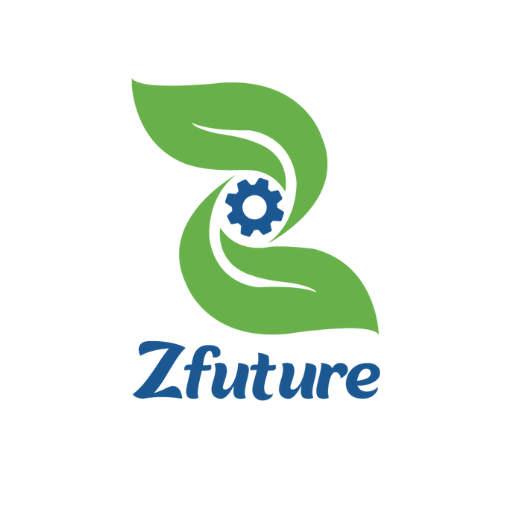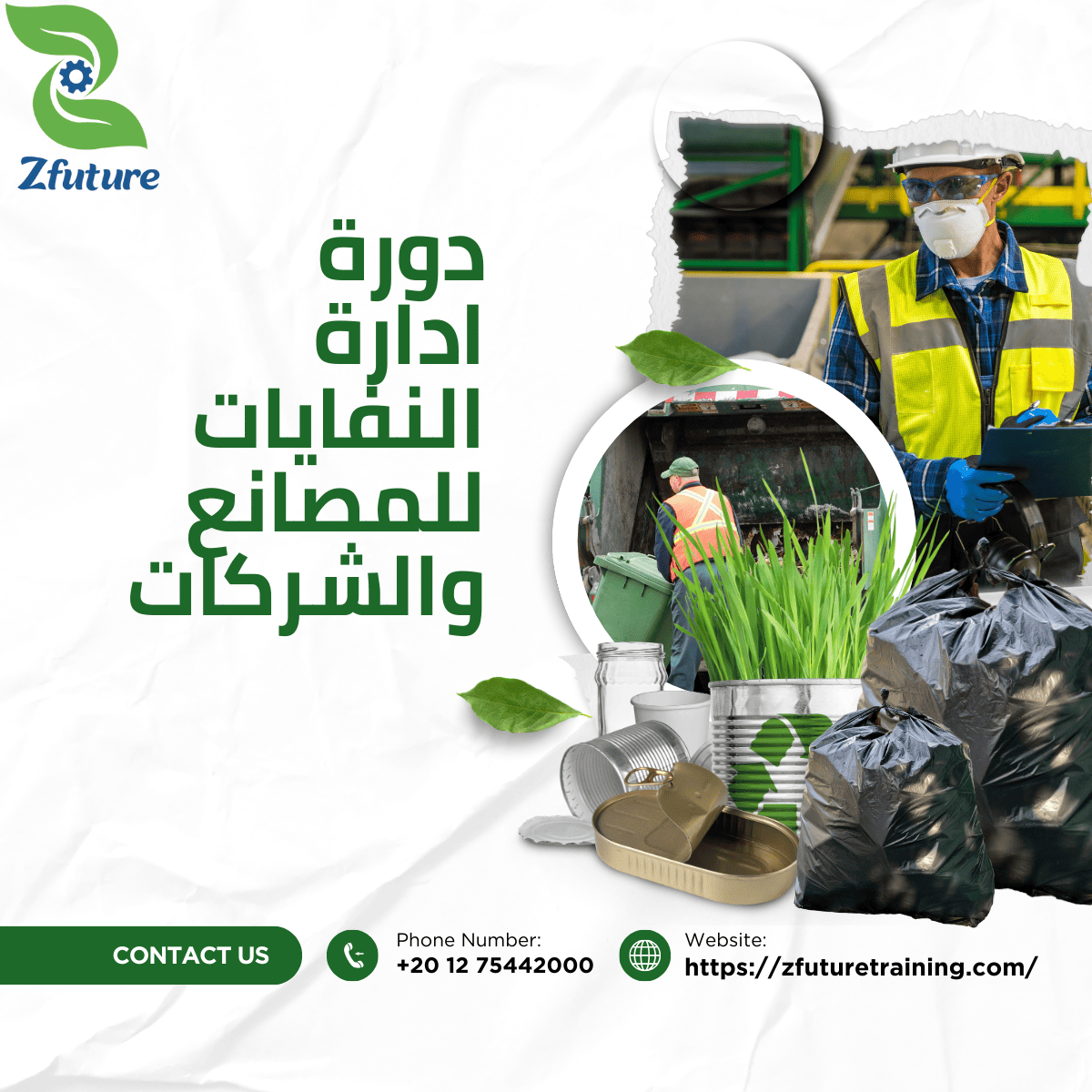Waste Management Course – Sustainable Waste Management with Accredited Certification
The Waste Management Course is currently one of the most important training programs in the field of environmental studies worldwide. We now offer a Waste Management Course that will help you gain a deeper understanding of waste and how to handle various types to protect the environment and optimize recycling of reusable waste for full benefit.
Today, we will explore important details about solid waste management or medical waste management, as well as the specifics of the waste management course available on our website. Don’t miss out on the opportunity—start learning now and gain valuable insights from ZFuture Consulting & Training Company.
Contact us now for free to get all the details about the training courses available from Zfuture Consulting and Training Company.
What Does Waste Management Mean?
Waste management refers to the proper handling of waste to minimize its negative impacts on the environment, while also exploring whether there is any benefit to recycling certain waste in a healthy manner that can help meet society’s needs for specific products. In general, waste management involves multiple stages, starting from sorting, then transportation, followed by treatment, and if possible, recycling or disposing of it in a way that does not harm the environment.
Types of Waste
Waste is not a single type, as it is categorized into several types based on its source. Here is a list of the most common types of waste according to their source:
- Household Waste
- Industrial Waste
- Agricultural Waste
- Medical Waste
Each of these waste types is managed differently. Household waste is not all suitable for sorting and recycling, while industrial waste has a higher likelihood of being recyclable. Agricultural waste is usually harder to recycle and reuse, as is medical waste, where medical tools used for patients are difficult to recycle due to the risk of transmitting infections and diseases.
What Will You Learn in This Course?
- Types of Waste: Understanding the different categories of waste.
- Recycling and Disposal Techniques: Learning proper methods for recycling and disposing of waste.
- Sustainable Waste Management Practices: Techniques for reducing waste and promoting sustainability.
- Legal and Environmental Regulations: Familiarization with regulations and environmental standards related to waste management.
- Practical Skills: How to implement efficient waste management in various sectors such as industrial, medical, and household.
By completing this course, you will receive an accredited certificate that demonstrates your expertise in sustainable waste management, which is essential for any individual or organization seeking to reduce their environmental impact and adopt green practices. Start your journey today with ZFuture Consulting & Training Company!

How is Waste Managed?
Waste management is a complex process that requires proper strategies to reduce its negative environmental impact. By obtaining a Waste Management Course, you can develop an appropriate strategy to handle waste and explore ways to either dispose of or recycle it, ensuring the waste is used in the most beneficial way possible.
The waste management process involves several stages, each focused on specific tasks. Workers play a particular role at each stage, aiming to produce recycled products that are useful to society. The stages of waste management include: waste collection, waste sorting, transporting waste to collection points, and finally, treatment or disposal.
What is the Mawan License?
The Mawan License is a type of license issued by the National Waste Management Center in Saudi Arabia. The goal of obtaining this license is to regulate any process related to waste in the Kingdom, from collection to sorting, and ultimately either treatment or environmentally safe disposal.
The Mawan License is granted after fulfilling certain requirements related to waste, ensuring that national health standards and international safety guidelines are met. Some of the activities requiring a Mawan License include:
- Collecting different types of waste, whether hazardous or regular, and transporting them.
- Treating and recycling waste.
- Importing and exporting waste of all types.
- Final disposal of waste.
Goals of the Waste Management Course
Obtaining the Waste Management Course is essential for enhancing your professional career in the job market. This course aims to help you become a strong competitor by achieving several objectives, including:
- Understanding the types of solid waste and their various sources.
- Being able to estimate the amount of solid waste and understand how to express its production rates and measurement methods.
- Understanding the physical and chemical properties of solid waste.
- Gaining knowledge about solid waste management systems, storage methods, and production sites.
- Learning how to collect, transport, and dispose of waste, as well as how to manage hazardous healthcare waste.
Who Should Take the Waste Management Course?
The Waste Management Course is recommended for various professionals, including engineers, technicians, and those working in waste collection and environmental engineering fields, as well as employees in key ministries such as the Ministry of Environment, Ministry of Health, and Ministry of Industry. Additionally, it is ideal for supervisors of cleaning units, public service facilities, and those involved in sorting, transporting, and collecting waste, whether in the public or private sector.
Key Topics in the Waste Management Course
The course consists of six key modules, each containing detailed information. Below are the main topics of the course:
- Introduction to Solid Waste and Its Types
- Definition of solid waste.
- Different sources of solid waste.
- Types of solid waste.
- Estimating Solid Waste Quantities
- Measuring solid waste quantities.
- Methods to express solid waste quantities.
- Estimating the volume of solid waste.
- Factors influencing waste production.
- Characteristics of municipal household waste and chemical properties.
- Solid Waste Management Systems
- Storage, collection, and street sweeping.
- Waste covering, gas control, and liquid control.
- Waste transport vehicles and testing equipment.
- Creating sanitary landfill cells and preparation.
- Setting up transfer stations and managing stormwater.
- Healthcare Waste Management
- Introduction to healthcare waste.
- Methods of storing, transporting, and treating healthcare waste.
- Handling radioactive and chemical waste.
- Methods for disposing of medicines.
- Utilizing Solid Waste
- The importance of recycling solid waste.
- Extracting and reusing materials from solid waste.
- Recycling paper, glass, plastics, textiles, and bones.
- Turning waste into soil enhancers.
- Energy extraction methods from solid waste (e.g., thermal conversion).
- Environmental and Health Impact of Solid Waste
- Diseases caused by solid waste.
- The impact of healthcare waste on human health and the environment.
- Risks posed by industrial waste on the environment and human life.
By the end of the course, you will have gained extensive knowledge in all areas of waste management, which will enhance your ability to contribute to environmental protection and sustainable waste practices.

Conditions for Obtaining the Waste Management Course Certificate
In order to receive a Waste Management Course Certificate, you must fulfill the following conditions:
- Attendance Requirement: You must attend at least 75% of the course.
- Interaction with the Instructor: Actively engage with the instructor or trainer during the course.
When Can You Receive the Waste Management Course Certificate?
Once the training program is completed, an electronic certificate will be issued, provided you meet the required attendance percentage.
- Physical Certificate: If you’re attending the training in-person at the academy, you will receive the paper certificate directly.
- Online Training: If you complete the course remotely, the certificate will be shipped to you within 5-7 working days, depending on your country and chosen shipping method.
Best Environmental Courses
To advance in the field of environmental studies, it’s crucial to take specialized courses. Here are some of the best courses you can take in the environmental field:
- Understanding Ecology
- Waste Management Course
- Environmental Economics Course
- Global Sustainability Courses
- Climate Change and Society Courses
- Sustainable Development Courses
- Natural Resources Sustainability Courses
- Environmental Justice and Equity Course
- Environmental Engineering Courses
- Environmental Impact Assessment Course
- Carbon Footprint Course
These courses will help you gain knowledge and skills that are highly valuable for a career in environmental management and sustainability.


Hi,
I am a working professional in the field of waste management in Kingdom of Saudi Arabia . Currently, looking to pursue waste management course. Please provide me more detail about the course in online.
please contact us +201080833841